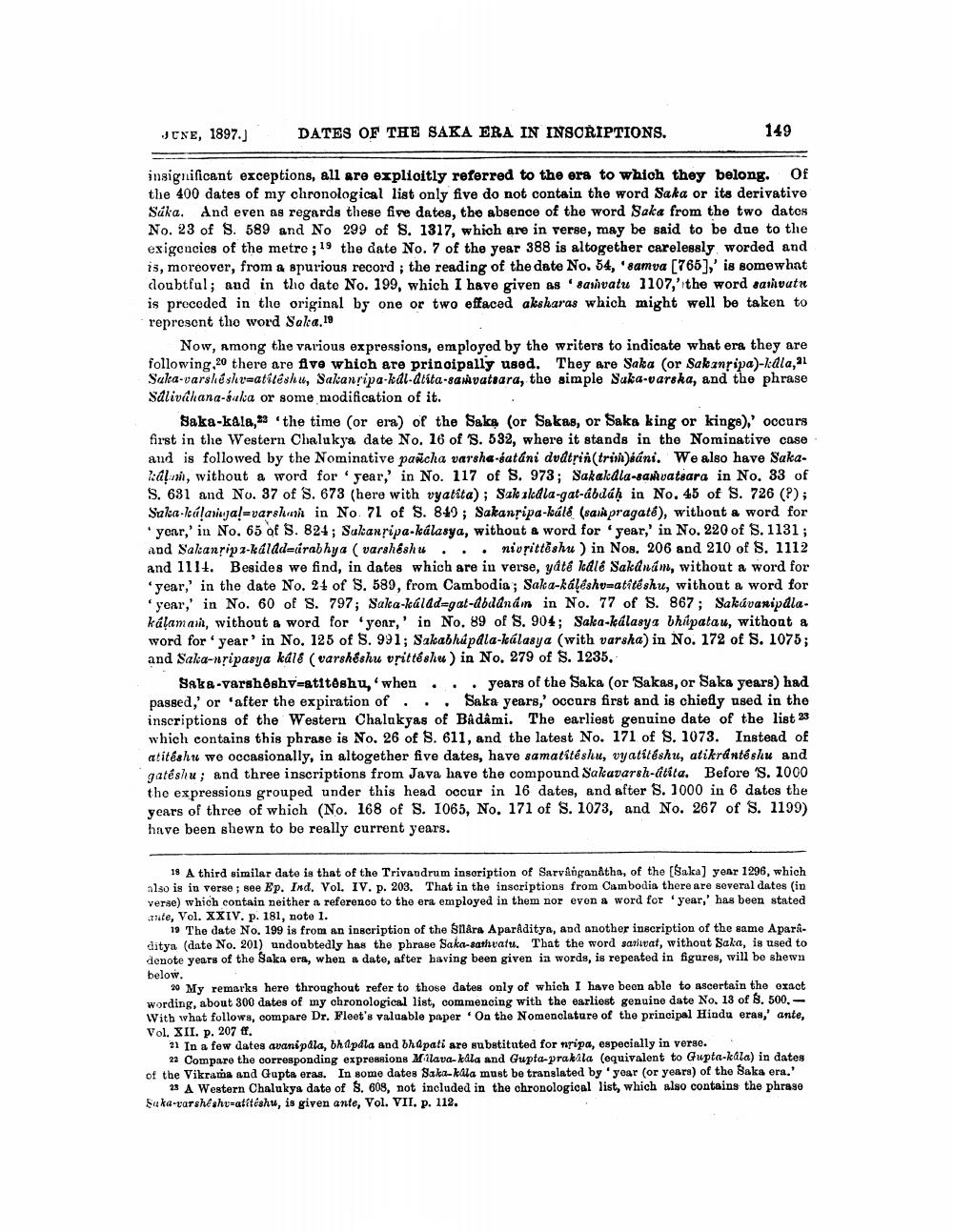________________
June, 1897.].
DATES OF THE SAKA ERA IN INSCRIPTIONS.
149
insignificant exceptions, all are explioitly referred to the ora to which they belong. Of the 400 dates of my chronological list only five do not contain the word Saka or its derivative Súka. And even as regards these five dates, the absence of the word Saka from the two dates No. 23 of S. 589 and No 299 of S. 1317, which are in verse, may be said to be due to the exigencies of the metro; 19 the date No. 7 of the year 388 is altogether carelessly worded and is, moreover, from a spurious record; the reading of the date No. 54, samva (765]' is somewhat doubtful; and in tho date No. 199, which I have given as 'sarivatu 1107,' the word sarvata is preceded in the original by one or two effaced aksharas which might well be taken to represent the word Saka 19
Now, among the various expressions, employed by the writers to indicate what era they are following 20 there are five which are prinoipally used. They are Saka (or Sakanripa)-kdla, al Saka-varsheshv=atiteshu, Sakanripa-kal-drita-saavatsara, the simple Suka-varska, and the phrase Sáliváhana-suka or some modification of it.
Saka-kala, the time (or era) of the Saks (or Sakas, or Saka king or kings)' occurs first in the Western Chalukya date No. 16 of 'S. 532, where it stands in the Nominative case and is followed by the Nominative pañcha varsha-satáni dvdtrii(triniáni. We also have Sakakami, without a word for 'year,' in No. 117 of S. 973; Sakakala-samvatsara in No. 33 of S. 631 and No. 37 of S. 673 (here with vyatita); Sak akdla-gat-abdáh in No. 45 of S. 726 (?); Saka-leál anival=varsh in No 71 of $. 849 ; Sakansipa-kúl& (sas pragato), without a word for
year,' in No. 65 of S. 824; Sukansipa-kálasya, without a word for year,' in No. 220 of S. 1131; and Salanripa-kaladzirabhya (varsheshu... nivsitteshu ) in Nos. 206 and 210 of S. 1112 and 1114. Besides we find, in dates which are in verse, yat& ldlé Sakdnám, without a word for year,' in the date No. 24 of S. 589, from Cambodia; Saka-káléshuratitéshu, without a word for year, in No. 60 of S. 797; Saka-kálddagat-dbdåndin in No. 77 of S. 867; Sakávanipdla. kálaman, without a word for 'yonr,' in No. 89 of S. 904; Saka-kalasya thipatau, without a word for year' in No. 125 of S. 991; Sakabhápala-kálasya (with varsha) in No. 172 of S. 1075; and Saka-uripasya kale (varshéshu vrittéshu) in No. 279 of S. 1235.
Saka-varsheshv-atitoshu, when... years of the Saka (or Sakas, or Saka years) had passed,' or 'after the expiration of ... Saka years,' occurs first and is chiefly used in the inscriptions of the Western Chalukyas of Badêmi. The earliest genuine date of the list 23 which contains this phrase is No. 26 of S. 611, and the latest No. 171 of S. 1073. Instead of atitéshu we occasionally, in altogether five dates, have samatitéshu, vyatitéshu, atikrántéshu and gatéshu; and three inscriptions from Java have the compound Sakavarsh-atita. Before 'S. 1000 the expressions grouped under this head occur in 16 dates, and after S. 1000 in 6 dates the years of three of which (No. 168 of S. 1065, No. 171 of S. 1073, and No. 267 of S. 1199) have been shewn to be really current years.
18 A third similar date is that of the Trivandrum insoription of Sarvanganaths, of the Saka) yenr 1296, which also is in verse; see Ep. Ind. Vol. IV. p. 203. That in the inscriptions from Cambodia there are several dates (in verse) which contain neither a reference to the era employed in them nor even a word for year,' has been stated inte, Vol. XXIV. p. 181, note 1.
19 The date No. 199 is from an inscription of the Bllara AparAditya, and another inscription of the same Aparaditya (anto No. 201) undoubtedly has the phrase Saka-sathvatu. That the word sallwat, without Saka, is used to denote years of the Baka era, when a dato, after having been given in words, is repeated in figures, will be shown below.
90 My remarks here throughout refer to those dates only of which I have been able to ascertain the oxact wording, about 300 dates of my chronological list, commencing with the earliest genuine date No. 13 of 8. 500,With what follows, compare Dr. Fleet's valuable paper on the Nomenclature of the principal Hindu eras,' ante, Vol. XII. p. 207 ff.
21 In a few dates avanipala, bhdpála and bhdpati are substituted for uripa, especially in verse.
22 Compare the corresponding expressions Milava-kala and Gupta-prakla (oquivalent to Gupta-kala) in dates of the Vikrama and Gupta eras. In some dates Saka-kala must be translated by 'year (or years) of the Baka era.'
23 A Western Chalukya date of 8. 608, not included in the chronological list, which also contains the phrase Buka-varshéshuzatitéshu, is given ante, Vol. VII. p. 112.




